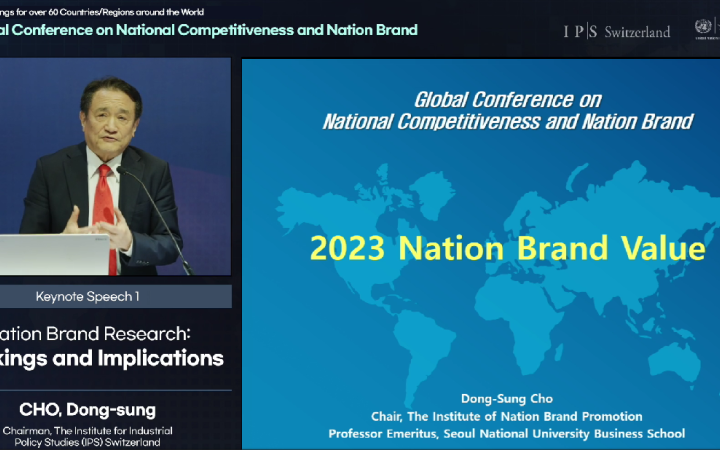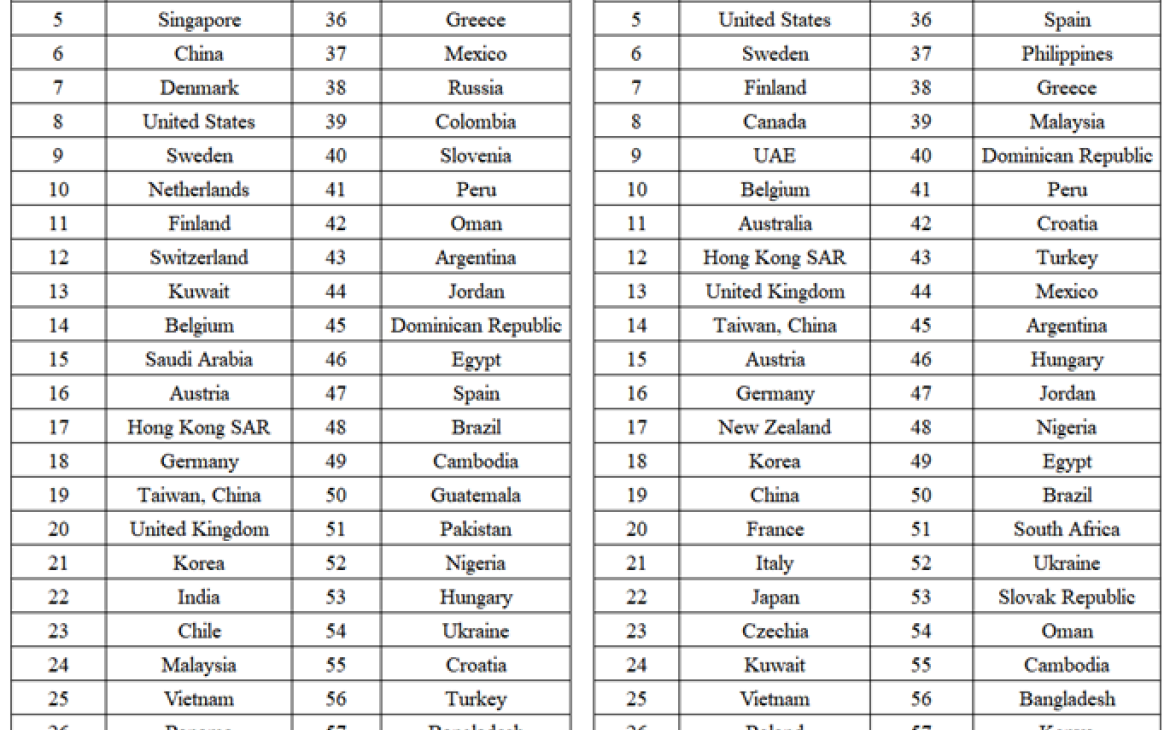26 October 2023, Seoul, Republic of Korea - UNITAR, and the Institute for Industrial Policy Studies (IPS) Switzerland co-hosted the global hybrid conference on National Competitiveness and Nations Brand, announcing the 2023 results of the National Competitiveness Report, led by IPS Switzerland. Over 140 participants from Asia, Europe, and the US attended the conference, virtually and in person. The event took place in partnership with aSSIST University, Franklin University Switzerland, Kyung-In Broadcasting Co., and The Washington Times. The results of the 2023 report can be found below.
Geopolitical Tensions Reshape Global Competitiveness: Insights from the 2023 IPS Rankings
Two Strategies for Mobilizing National Resources
The results of the ‘IPS National Competitiveness Research’ were released on October 26, 2023. This research was jointly conducted by two Swiss organizations: the Institute for Industrial Policy Studies Switzerland (IPS-S) in Geneva and the United Nations Institute for Training and Research (UNITAR) in Geneva.
Three key global institutions release national competitiveness ranking reports annually: the International Institute for Management Development (IMD), the World Economic Forum (WEF), and IPS Switzerland. Both the IMD and WEF each release a single overall competitiveness ranking, while IPS Switzerland differs by releasing two distinct strategy rankings—cost and differentiation strategies. By effectively leveraging the two strategic options, they can positively influence their rankings.
Global Fault Lines in Focus: US-China conflict and Russia-Ukraine War
The IPS Strategy Rankings 2023 provide critical insights into how geopolitical tensions are reshaping the landscape of national competitiveness across the globe. This year, the report comes at a particularly sensitive time, offering clues about the repercussions of the US-China conflicts and the Russia-Ukraine War on national strategy rankings.
In a year marked by escalating global tensions, the United States and China followed divergent paths in their competitiveness rankings. The U.S. rose to 5th place in the Differentiation Strategy (DS) category and secured the 8th position in the Cost Strategy (CS) ranking out of 62 countries and regions. This positive trajectory implies that America's focus on innovation and industrial development has been effective, potentially mitigating some of the adverse effects of its geopolitical challenges. In sharp contrast, China experienced a significant setback, dropping to 19th place in the DS ranking, while maintaining its 6th place in the CS category. This decline indicates that ongoing geopolitical disputes have severely undermined its competitive edge on the global stage.
Interestingly, Eastern European countries like the Czech Republic and Poland, along with Latin American nations such as Chile, Mexico, and Brazil, have seen an upswing in their CS rankings. Analysts suggest that the 'China Plus One' diversification strategy adopted by multinational corporations might be redirecting investments towards these nations, enhancing their cost competitiveness in the global market.
The Russia-Ukraine War adds another layer of complexity to the narrative. Russia's competitiveness has been hit severely, evidenced by its plummet to 38th position in CS rankings and an even more alarming 60th in DS rankings. Most indicators for national competitiveness, including demand conditions, entrepreneurship, business context, and professional capabilities, have deteriorated year-on-year for Russia.
Ukraine, despite being at the epicentre of conflict, has fared somewhat better. It has maintained a relatively stable position in the competitiveness landscape, with its CS ranking remaining at 54th and DS dropping slightly to 52nd place. Although Ukraine has seen declines in the same four indicators as Russia, it has demonstrated greater resilience, managing to weather the geopolitical storm more effectively.
About IPS model for national competitiveness and 2023 Rankings
IPS evaluates national competitiveness using eight factors, divided into four physical and four human elements. The physical factors encompass supply conditions, demand conditions, related industries, and the business context. The human factors include workers, policymakers & administrators, entrepreneurs, and professionals. When a country adopts a cost strategy, more weight is inherently given to cost-driven elements like factor conditions and workers. Conversely, when a differentiation strategy is utilized, the weightings for the eight factors vary, with greater emphasis placed on demand conditions and professionals.
Table 1: Two National Competitiveness Rankings
Table 1 displays the results of the two strategy rankings for 2023. Interestingly, the rankings based on Cost Strategy (CS) and Differentiation Strategy (DS) yield notably different outcomes. In the CS rankings, the top four economies—Canada (1), Australia (2), the United Arab Emirates (UAE) (3), and New Zealand (4)—are all characterized by abundant resources. Conversely, in the DS rankings, developed economies like Denmark (1), Switzerland (2), Singapore (3), and the Netherlands (4) dominate the top positions.
About The Institute for Industrial Policy Studies (IPS)
IPS was established in South Korea in 1993 and moved its research activities to Geneva, Switzerland in 2020 to globalize the national competitiveness research, in cooperation with UNITAR and Taylor Institute of Franklin University Switzerland.



